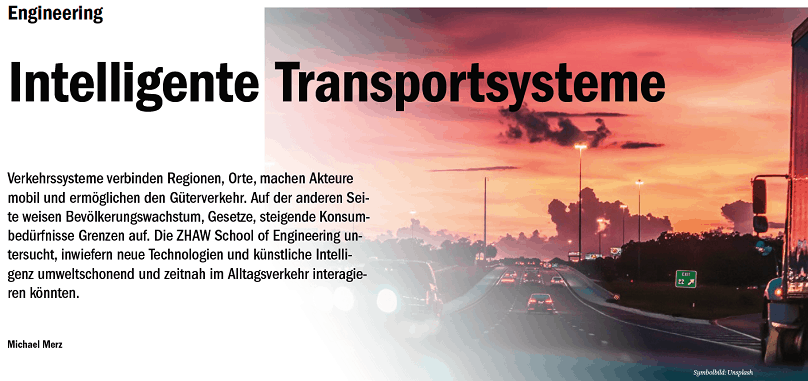Intelligent transport systems
Transport systems connect regions, places, make actors mobile and enable the transport of goods. On the other hand, population growth, legislation and increasing consumer needs have their limits. The ZHAW School of Engineering is investigating the extent to which new technologies and artificial intelligence could interact in an environmentally friendly and timely manner in everyday traffic.

Regions with different locational qualities complement each other and, in the best case, according to a statement by the ZHAW School of Engineering, have well-functioning transport systems.
The ZHAW Department is one of the leading technical education and research institutions in Switzerland. The disciplines conducting research here are also increasingly investigating how humans and artificial intelligence interact in traffic.
As distances, frequencies and speeds of traffic increase, so do the burdens such as traffic volume, noise and emissions.
What do transport systems look like that move people and goods to their destination in a way that is both ecologically and economically sustainable?
Sustainable transport systems
In the research area of transport systems, the Institute for Sustainable Development (INE) at the ZHAW researches the mobility of people and goods and develops sustainable solutions.
Some transport conditions have to be managed globally, nationally and regionally. New technologies and transport concepts offer potential for ensuring sustainable human mobility and integrating freight logistics. It is crucial to be able to assess future developments and derive strategies for technology development, transport policy and planning.
The INEs are concerned with these main aspects:
- Definition of requirements for mobility, freight and transport systems
- System analysis mobility and freight transport - assessment of technologies with regard to their potential
- Supporting decisions in business, politics and planning with regard to sustainability
- Development of strategies, roadmaps and mobility concepts Pw, bus, train, taxi, truck: the adaptation of transport and freight systems is one of the major challenges facing society.
Ongoing "smart" projects
The adaptation of transport and freight systems is one of the great challenges of the present and the future. The following projects accompany ZHAW fields of study:
At INTENDan EU-funded research project, research gaps in the European transport sector are being identified in order to be able to distribute financial resources for future research projects in a more targeted and efficient manner. This is intended to keep the European transport sector competitive in the long term.
SCCER Mobility aims to develop knowledge and technologies essential for the transition from the current to a sustainable transport system, with minimum CO2 emissions and primary energy demand and 'near-zero' pollutant emissions.
smart commuting focuses on digital changes in the world of work, including spatial structures and technological developments for increasing commuter numbers and, above all, distances. Smart Commuting examines "Mobility as a Service (MaaS)" approaches and offers with regard to their prerequisites and potentials.
The project E-Destination investigates the infrastructural and organisational potentials of electric mobility in the Lake Constance region and focuses on its use for tourism.
The mobility platform MobINE once again presents innovations, current research results and news on increasingly intelligent mobility.









